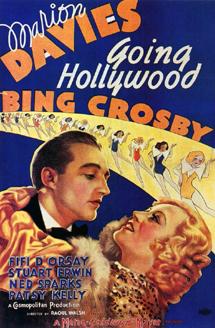|
Going Hollywood
Going Hollywood is a 1933 American pre-Code musical film directed by Raoul Walsh and starring Marion Davies and Bing Crosby. It was written by Donald Ogden Stewart based on a story by Frances Marion. The film was released by Metro-Goldwyn-Mayer on December 22, 1933. PlotAn infatuated school-teacher, Sylvia Bruce (Marion Davies), follows Bill Williams (Bing Crosby), a popular crooner, to Hollywood where he is to make a picture. On board the train she obtains a job as maid to Bill's French fiancée and leading lady, Lili Yvonne (Fifi D'Orsay), and meets the film's director, Conroy (Ned Sparks), and promoter, Baker (Stuart Erwin). On arrival in Hollywood she is befriended by Jill (Patsy Kelly) and shares her rooms. At the Independent Art Studio in Hollywood, where the film is being made, Lili's temperament and lack of talent cause Conroy much concern. Eventually, after losing her temper with a blackfaced Sylvia who pretends to be a fan asking for another star’s autograph, Lili refuses to continue unless Sylvia is removed from the studio. She is persuaded to stay and production continues with her singing "Cinderella's Fella" but Conroy is still not satisfied and an angry Lili walks out. Sylvia impersonates Lili's version of the song and ends with an imitation of Lili's tantrums. Lili returns in time to hear Sylvia and there is a brawl in which Lili gets a black eye. Baker, who has also heard Sylvia, intervenes by firing Lili and engaging Sylvia for the part. Baker asks Sylvia to accompany him to a party but withdraws when Bill expresses his own interest in her. Bill takes Sylvia to dinner and the party but a quarrel ensues and she accuses him of insincerity. Bill deserts the film and goes with Lili to Tijuana where, drinking heavily, he receives a telephone call from the studio with the ultimatum that if he does not return they will get a replacement. Lili advises him to let them do so and suggests that they fly together to New York and on to Paris. Sylvia finds him and pleads for him to come back to the studio but returns without him. In Hollywood there is difficulty with the player chosen to replace Bill and eventually Bill finally appears at the Studio to rejoin Sylvia in the film's closing sequence to sing "Our Big Love Scene". The song "Beautiful Girl" is sung by Crosby at the beginning of the film before his departure for Hollywood when technicians arrive to record it. When he boards the train at Grand Central Terminal there is a big production number where he and the chorus sing "Going Hollywood". He also sings a few lines of "Just an Echo in the Valley". Crosby is also heard singing "Our Big Love Scene" on the radio when Jill is showing Sylvia her apartment. "We'll Make Hay While the Sun Shines" is a dream-sequence production number with thunderstorm effects at the Studio and is featured by Crosby, Davies, chorus and dancers. An impersonation act by The Radio Rogues is also filmed at the studio and includes imitations of Kate Smith ("When The Moon Comes Over The Mountain"). Russ Columbo ("You Call It Madness But I Call It Love"), Morton Downey ("Remember Me?") and Rudy Vallee ("My Dime Is Your Dime"). Crosby sings "After Sundown" at the party.[2][3] Cast
SoundtrackThe film's original songs were written by the team of Nacio Herb Brown (music) and Arthur Freed (lyrics).
Crosby recorded some of the songs for Brunswick Records[4] and "Temptation", "We'll Make Hay While the Sun Shines" and "Beautiful Girl" reached the charts of the day peaking at Nos. 3, 8 and 11 respectively.[5] ProductionDavid Ogden Stewart wrote the film for Marion Davies, who he called "an awfully good comedienne". He felt she and Bing Crosby "did a very good job together. She had a real hoydenish, don’t-give-a-damn feeling about her, and it came across on the screen. She was a good mimic, and she loved to make fun of people; but mainly she loved to have fun." [6] ReleaseGoing Hollywood was released on home video in May 1993.[7] Warner released it on DVD in July 2013.[8] ReceptionThe New York Times welcomed the film.
Variety' s reaction was mixed:
TV Guide called it "fluffy fun" with a "literate and amusing screenplay".[11] A reviewer on Turner Classic Movies praised Crosby's singing and said that his voice never falters.[12] Jamie S. Rich of DVD Talk rated it 3.5/5 stars and wrote, "Going Hollywood is almost the perfect Hollywood movie musical cliché."[8] Box officeThe film grossed a total (domestic and foreign) of $962,000: $620,000 from the U.S. and $342,000 elsewhere resulting in a loss of $269,000.[1] Radio adaptationGoing Hollywood was presented on Musical Comedy Theater December 10, 1952. The one-hour adaptation starred Denise Darcel, Andy Russell, and Mary McCarty.[13] References
External links |
||||||||||||||||||||||||||||||||||||
